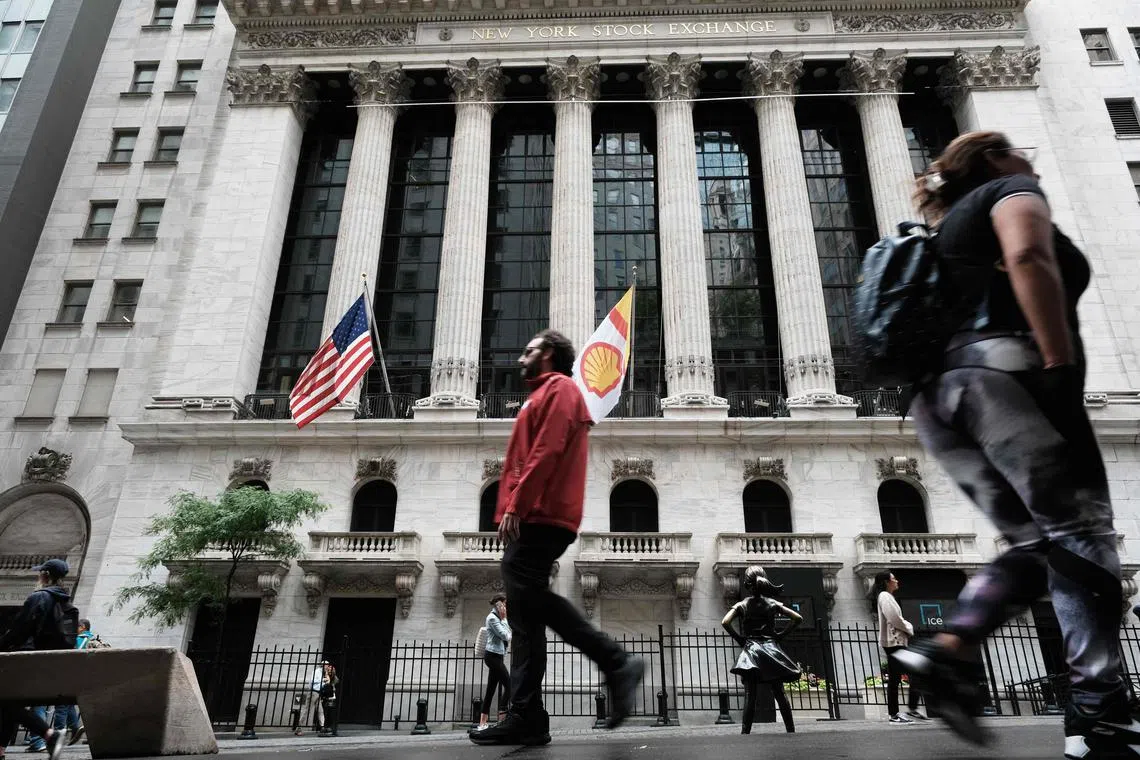US companies scramble to cut costs, pay down debt as interest rates surge
Sign up now: Get ST's newsletters delivered to your inbox

Interest costs at US companies rose by 22 per cent in the first quarter, and are among the reasons companies are being forced to look for savings.
PHOTO: AFP
Follow topic:
New York – As the United States Federal Reserve signals it will likely tighten the money supply further, companies are scrambling to cope with the impact of more than a year of rate hikes, taking steps like cutting costs and paying down debt.
Interest costs at US companies rose by 22 per cent in the first quarter compared with a year earlier, soon after the Federal Reserve started raising rates, according to a recent survey of about 1,700 businesses by Calcbench, a data provider.
Electronics giant Apple and telecom provider Verizon Communications are among the corporations that have seen their interest costs surge.
In the case of Verizon, interest expense soared to US$1.21 billion (S$1.6 billion) in the first quarter from US$786 million in the same period a year earlier.
Those increases, alongside higher costs elsewhere – including for wages, materials and energy – are forcing firms to look for savings.
Apple, for example, is taking steps like delaying bonuses for some divisions and scaling back hiring to keep costs in check.
Higher interest expenses also raise the bar for how much companies have to earn from projects to cover financing costs, potentially resulting in less investment.
Additional rate increases by the Fed could result in even higher interest spending.
The US central bank left rates unchanged at its meeting on Wednesday,
Fresh quarterly forecasts from the central bank showed borrowing costs rising to 5.6 per cent by the year end, according to the median projection, compared with 5.1 per cent in the previous round of projections.
A move by the Fed to keep rates “higher for longer” will likely put more pressure on companies with weaker credit ratings, strategists at Morgan Stanley wrote in a note on Tuesday.
For bigger businesses with higher ratings, sustained high borrowing costs will likely bring a gradual decline in interest coverage ratios and a focus on right-sizing outstanding debt and balance sheets, the analysts said.
Carnival Corp, the cruise ship operator with junk credit ratings, is working to slash debt and interest costs after it raised US$24 billion in additional funding during the pandemic. It reported US$539 million in interest expense during the first quarter, up from US$368 million during the prior-year period.
But there is pressure even on investment-grade rated companies.
At railroad operator Union Pacific Corp, interest expenses rose to US$336 million during the first quarter, up 9 per cent from the prior-year period.
“Higher interest expense means you have less money to pay for other expenses, for example wages or investments,” said Mr Wes Bricker, vice-chairman and co-leader of the trust solutions business at professional services firm PricewaterhouseCoopers. That can be challenging for companies, particularly those that have weak credit metrics or generate little cash from operations.
To be sure, companies are generating higher interest income from cash and other short-term investments, including in money market funds.
US corporate cash holdings stood at US$4 trillion at the end of the first quarter, up US$47 billion from the end of 2022 and up US$10 billion from the prior-year period, according to an analysis of Federal Reserve data by The Carfang Group, a treasury consulting firm.
“Higher rates can also create opportunities,” said Mr Fraser Woodford, Warner Bros Discovery’s treasurer, in an e-mail in May.
“We are earning more on cash holdings and can also take advantage of bonds trading at a discount, which makes them attractive candidates for retirement,” he added.
But, as most companies hold significantly more debt than cash, higher interest income often is not sufficient to compensate for the rise in interest rates, said Mr Barak Ravid, Americas leader at EY-Parthenon, the strategy consulting arm of the professional services firm.
“It’s not acting as a sufficient offset,” Mr Ravid added. BLOOMBERG

